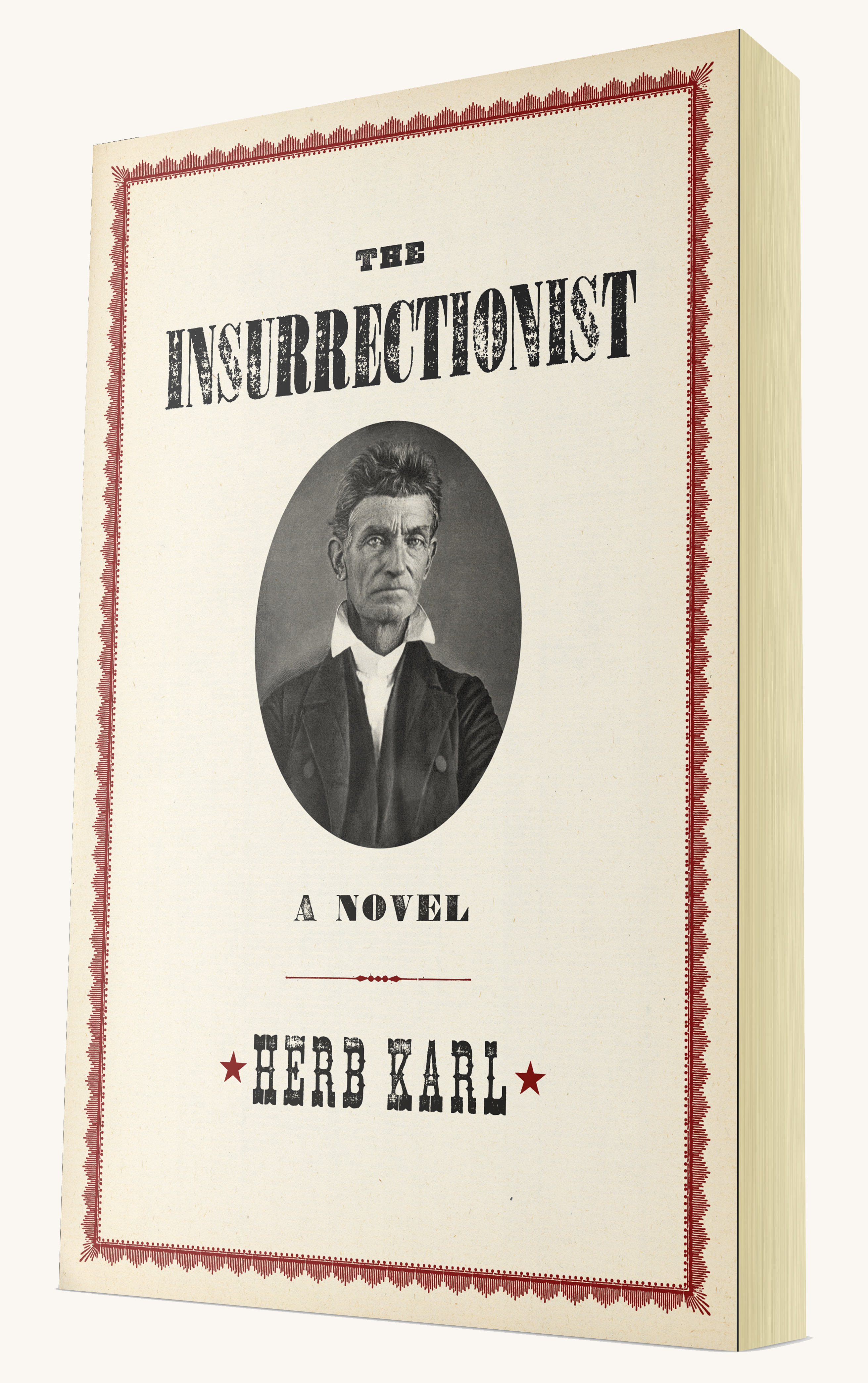 From his involvement in Bleeding Kansas to the invasion of Harpers Ferry, John Brown has gone down in American history as one of the most dogmatic and influential abolitionists in the years leading up to the Civil War. The Insurrectionist: A Novel by Herb Karl presents a fictionalized account of John Brown’s involvement in the ongoing abolitionist movement and illustrates just how his acts became a catalyst for the war between the North and South.
From his involvement in Bleeding Kansas to the invasion of Harpers Ferry, John Brown has gone down in American history as one of the most dogmatic and influential abolitionists in the years leading up to the Civil War. The Insurrectionist: A Novel by Herb Karl presents a fictionalized account of John Brown’s involvement in the ongoing abolitionist movement and illustrates just how his acts became a catalyst for the war between the North and South.
Author Herb Karl kindly agreed to answer a few questions for CRP’s blog readers, below.
What drew you to John Brown as a subject? Have you always had an interest in Civil War history?
Ever since my days as a student of Michael Shaara (the Pulitzer Prize–winning author of the Civil War novel The Killer Angels), I’ve been hooked on the antebellum period in American history. As I began to read more about the events that led to the war (by far the bloodiest in our history), I began to think about John Brown and how he served as one of the several catalysts that ignited a conflict resulting in the deaths of almost three quarters of a million combatants from both the North and the South. My reading and research (noted in the acknowledgements at the end of the book) taught me a great deal about the man, his family and his allies. My goal was to breathe life into the information I’d collected—much like Stephen Crane did in The Red Badge of Courage.
Why did you decide to make this a novelization of Brown’s life as opposed to a nonfiction biography?
Choosing to write a novel about Brown’s war on slavery—even though it relied heavily on the historical record—permitted me to “connect the historical dots,” to give dramatic form to the string of events that preceded Brown’s invasion at Harpers Ferry. After giving some background information, I could plunge the reader into the caning of Charles Sumner on the floor of the US Senate, an event revealing the attitudes and behavior of a Southern elite that morphed into a tangible representation of Brown’s adversary throughout the novel from Bleeding Kansas, to the Dred Scott ruling, to the invasion of Harpers Ferry. As I stated in a note to the reader, “my only other purpose has been to bring the characters to life by imagining what they may have thought and said.”
Brown is known for his political speeches and actions, but he was certainly an involved
family man too. Can you tell us about his family?
As far as Brown’s character is concerned, I hoped to show that the “old man”—as he was known to his contemporaries—wasn’t the religious fanatic some have portrayed him to be. He was definitely a pious man, a man of Christian principles, but he was also a patriot who took the words of the nation’s founding documents—especially the Declaration of Independence—literally. More than anything else, Brown was a man of great moral sensibility who lived at a time when the nation seemed to have lost its moral compass. And because of the strength of his beliefs, he was unable to sit back and do nothing. His unique powers of persuasion enabled him to convince people—financial backers and young men willing to fight—that he could change the course of the nation.
Brown was also a man with strong family ties who tried to imbue his children with his beliefs. However, his sons grew up to become independent thinkers who needed neither a Christian faith nor a sense of patriotism to persuade them of the rightness of their father’s cause. And while Brown appreciated his sons joining him in his war on slavery, he often delayed praising them, which must have been a source of disappointment to those seeking his approval. Brown had a tremendous amount of respect and admiration for his wife, Mary. She became the caretaker of the family, enabling Brown to pursue his cause. But she also had made a life for herself, becoming socially active in the women’s rights movement during her husband’s frequent absences from their home in upstate New York.
 Do you think Brown has become a misunderstood figure of history? How so?
Do you think Brown has become a misunderstood figure of history? How so?
I do believe that Brown has become a misunderstood figure in our history. Too often he has been treated as a rather uncomplicated fellow with a big ego and a fanatical will to make a name for himself as a national hero. I found him to be an intelligent man who profoundly believed in the rightness of his cause and who found justification for his actions in his Christian faith and the fundamental aspects of the American mythos. He was not without his shortcomings, occasionally shaping his perceptions of reality to suit his purposes.
Who would you say is your reader? A Civil War buff? A historical fiction fan? And, has
fictionalizing Brown’s story lent itself to widening your readership?
I think anyone who wants to get to know my interpretation of the real John Brown and his influence on the history of the nation could benefit from reading The Insurrectionist. It’s a book intended not only for the history buff but also just about anyone who wants to walk alongside a man who engineered the penultimate event leading to the American Civil War.
For more information about what happened to those featured in The Insurrectionist, click here.
Herb Karl is an emeritus faculty member of the University of South Florida St. Petersburg. He is the author of a YA novel, The Toom County Mud Race, which was published as an honor book by Delacorte. He is also the author of a short story selected for publication in From One Experience to Another, a collection of stories in which award-winning authors share real-life experiences through fiction. He lives in Burnsville, North Carolina
“[This novel] is filled with often overlooked historical detail and offers a balanced account of Brown’s life-long passion to free the enslaved.” —BooklistOnline
The Insurrectionist officially published on February 1, 2017, and is available wherever books and e-books are sold.
No Comments
No comments yet.